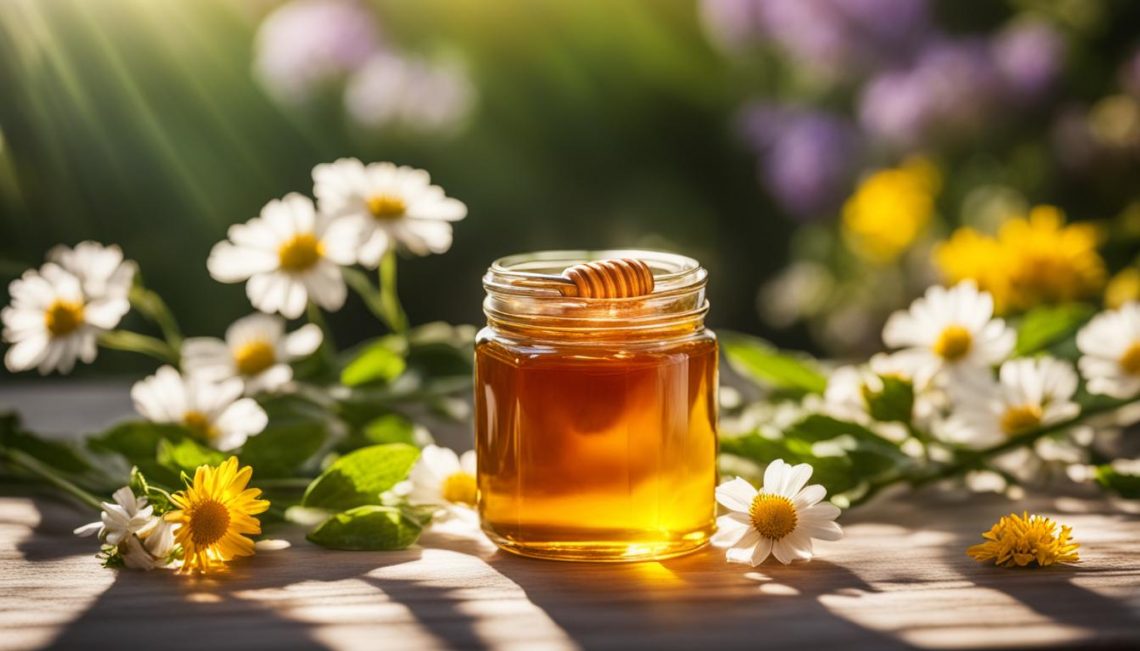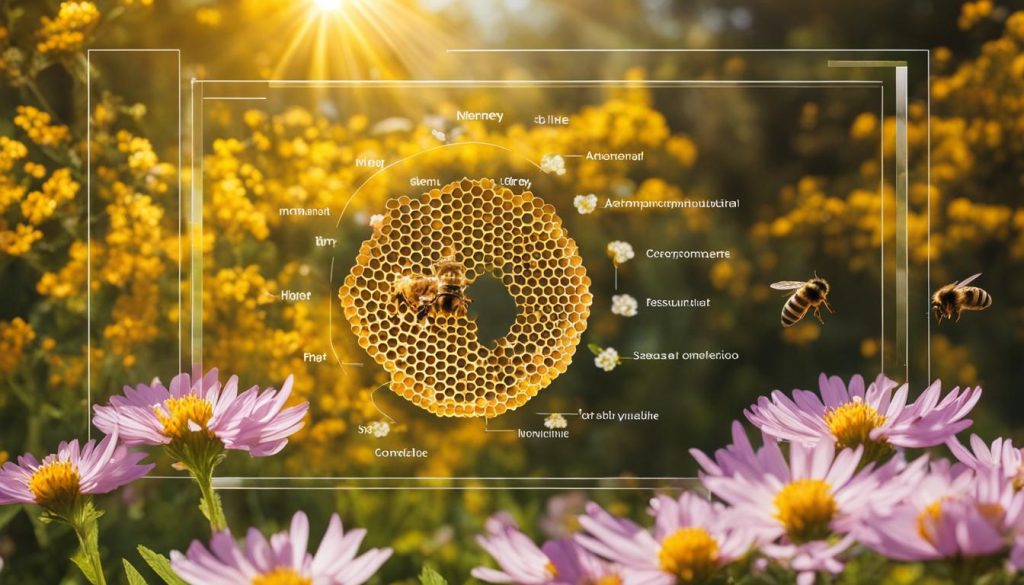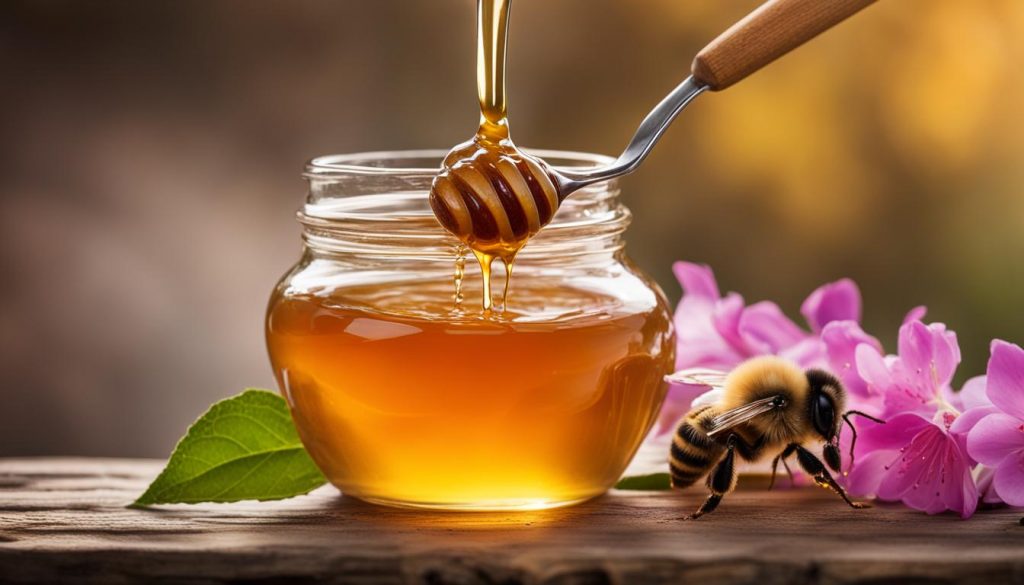
Soothing Seasonal Allergies with Honey
Over 50 million Americans deal with allergies each year. Many face seasonal types. Honey as a remedy for these allergies is getting attention. This sweet option is explored to see if it’s a myth or a true solution.
Honey isn’t just sweet on your palate; it has been considered healing for ages. In our search for natural remedies, honey stands out. It aims to please our taste and may ease our allergy symptoms. We’re figuring out if honey is truly beneficial against seasonal allergies.
The Buzz Around Honey as a Remedy for Allergies
Exploring the sweet world of honey reveals its potential as an allergy remedy. Many people look for natural relief options. Honey has been a traditional favorite gaining popularity. But is honey effective? What do the experts think? Let’s take a closer look at honey for immunotherapy and experts’ views on honey and pollen.
Understanding Immunotherapy: How Honey is Thought to Help
Immunotherapy involves exposing the body to small amounts of allergens to build tolerance. The idea is that eating local honey introduces pollen to our bodies. This can make our immune systems less sensitive to these allergens over time. This is why many see honey as a natural way to manage allergies.
Evaluating the Theory: What Experts Say About Honey and Pollen
The debate on honey and pollen for allergies is interesting. Allergists note that pollen in honey differs from what causes allergies. The pollen that triggers allergies comes from trees, weeds, or grasses. Honey’s pollen comes mostly from flowers. Even though some stories support honey as an allergy remedy, scientific proof is still needed.
Honey for Seasonal Allergies: Myth Versus Fact
In the busy spring and fall, we often turn to honey to fight off seasonal allergies. A spoonful of this sweet treat is believed to help with sneezes and sniffles. We’re here to clear up the myths and facts about honey for seasonal allergies for those exploring honey and allergies.
Many think eating local honey works like a natural vaccine against pollen. But, studies show honey mainly contains flower pollen. This pollen isn’t what triggers our allergies. Real allergy-causing pollen comes from trees, grasses, and weeds, spread by wind, not bugs.
| Myth | Fact |
|---|---|
| Consuming local honey desensitizes us to allergens | Honey contains primarily flower pollen, not the airborne allergens causing seasonal symptoms |
| Processed honey offers no allergy relief | While not an allergen blocker, processed honey can soothe throat irritation |
Understanding the truth about honey and allergies is empowering. Processed honey might not block allergens, but it can soothe a sore throat. With this insight, we can enjoy our honey more, knowing what it can and can’t do for seasonal allergies.
An Allergist’s Perspective on Honey and Allergy Relief
Allergists have a key role in discussing honey and allergies. They help us see the truth about local honey and its effect on allergies. They debunk myths and share insights on whether traditional remedies work.
The Problem with Local Honey and Seasonal Allergens
Many think local honey helps fight seasonal allergies, like a natural vaccine. But, allergists warn that the matchup between local honey and allergens isn’t perfect. The idea that local honey can make us less sensitive to allergens doesn’t hold up.
Local honey at farmers’ markets comes from flowers, not allergy-causing trees, weeds, or grasses. The amount of pollen in honey varies a lot. So, allergists recommend other ways to get allergy relief.
Why Insect-Borne Pollen in Honey Isn’t Causing Your Allergies
Allergists point out a key fact: not all pollen is bad for allergies. The pollen in honey, carried by insects, doesn’t cause those seasonal allergy symptoms. It’s wind-borne pollen that’s the real problem.
This info helps us understand pollen and allergies better. Honey has benefits, but it might not be the cure-all for allergies we thought. Especially since individuals have different sensitivities to pollen.
Clinical Studies: Does Honey Really Alleviate Seasonal Allergies?
Many people are turning to natural remedies to ease their health issues. They wonder if honey, a sweet natural elixir, can help with seasonal allergies. Clinical studies on honey and seasonal allergies have looked into this. Yet, their results have been as mixed as the many types of honey.

Research has looked at how eating honey might affect honey ingestion and allergic rhinitis. Allergic rhinitis has symptoms similar to seasonal allergies. Can honey be a natural solution, or should we keep looking for answers?
Research Outcomes: Honey Ingestion and Allergic Rhinitis Symptoms
A study suggested eating honey might reduce allergic rhinitis symptoms. Symptoms include sneezing, a runny nose, and eye irritation. The results were interesting but not definite. The study wasn’t big enough to be sure. Other research found honey was no better than a placebo.
Contrasting Results: The Need for Larger-Scale Research
These mixed findings point to one thing: we need more research. There’s a need for larger-scale research on honey for allergies. With more data, we could understand honey’s true value for allergic rhinitis. As we seek natural remedies, the possibility of honey as a solution stays uncertain but intriguing.
The Safety Concerns of Using Unprocessed Honey
Adding honey to our diets can be beneficial, but we must think about the safety concerns of unprocessed honey. Unprocessed honey has natural benefits. However, it also comes with risks we can’t ignore.
Allergic Reactions to Unprocessed Honey: Recognizing the Risks
Unprocessed honey can lead to allergic reactions. People allergic to bee pollen may face issues. They could get symptoms like itching and swelling.
If you’re allergic to pollen or bees, talk to a doctor before trying unprocessed honey. Unprocessed honey has sugars and might have allergens from pollen. This can trigger allergic reactions.
Infants and Honey: The Botulism Risk
We need to be careful with infants and unprocessed honey. Botulism risk in infants and honey means babies under one should not have honey. This is due to Clostridium botulinum spores found in some foods and soil, as well as unprocessed honey.
Babies’ digestive systems are not fully developed. Eating these spores can cause a serious illness called infant botulism. So, it’s crucial to avoid giving honey, whether unprocessed or processed, to infants for their safety.
Knowing these safety issues is important. We encourage you to make safe choices about honey in your diet or your family’s. Always put health and safety first.
Processed Honey for Coughs and Throat Irritation
Looking for relief from coughs and throat irritation? Many of us trust old remedies that work well. Processed honey is a favorite for easing coughs because it’s soothing. Honey is sweet and its thickness coats the throat well. This helps calm cough discomfort. Honey is also great for throat irritation as a tasty treatment. It’s good in warm tea or just off the spoon.
Honey’s ability to soothe coughs is backed by research. It acts as a natural way to stop coughs, safer than some medicines. Processed honey becomes a helper during cold and flu times. It’s also good when things in the air bother our throats. So, how does processed honey help us feel better?
- Its thickness creates a protective film over the irritated mucous membranes in the throat.
- Antioxidants and enzymes in honey can aid in reducing inflammation and soothe a raw throat.
- Naturally occurring sugars in honey provide a gentle energy boost for those feeling under the weather.
When looking at options for throat aches and coughs, processed honey is simple and works well. It’s an easy remedy we can all use. It shows the kind of care we need when facing these usual health issues.

“Honey is more than just a sweetener. It’s natural comfort for throats in distress. This makes it essential for dealing with coughs.”
Please note that while honey is suitable for adults and children over one year of age, it should not be given to infants under twelve months due to the risk of infant botulism.
How Bees, Pollen, and Honey Factor into Allergy Symptoms
Many of us are curious about how seasonal allergies connect to nature. Specifically, we’re interested in how bees, pollen, and honey impact allergy symptoms. It’s crucial to understand how bee pollination differs from the pollen in the air.
Understanding Pollen’s Role in Seasonal Allergies
Pollen is a major allergen that triggers seasonal allergies. It mainly comes from weeds, trees, and grasses. This pollen can float in the air, enter our noses, and cause allergies. When we breathe it in, our immune system might react too strongly. This leads to sneezing, itchy eyes, and a runny nose.
The Difference Between Bee Pollination and Environmental Pollen
Bee pollination and environmental pollen are different. Bees carry pollen between flowers, helping plants grow and make honey. This pollen is heavy and sticky, so it doesn’t fly around in the air. Because of this, bee pollen rarely causes the allergy symptoms many of us experience.
Honey, which has pollen, doesn’t usually fix our seasonal allergies. But, it can still be helpful, especially for soothing a sore throat.
| Pollen Source | Type of Pollen | Likely to Cause Allergies? | Common Role |
|---|---|---|---|
| Weeds | Environmental | Yes | Trigger seasonal allergies |
| Trees | Environmental | Yes | Cause allergic reactions during specific seasons |
| Grasses | Environmental | Yes | Responsible for hay fever |
| Flowers (via Bees) | Bee Pollination | No | Pollinate plants and contribute to honey production |
Learning more, we see that while honey might not stop our allergies, bees are vital to our world. They pollinate plants, giving us honey and supporting biodiversity. However, to tackle seasonal allergies, we must focus on the environmental pollen in the air.
Alternative Natural Remedies to Consider for Seasonal Allergies
Many of us search for relief from seasonal allergies beyond honey. There’s a variety of natural remedies for seasonal allergies that can help. Exploring alternatives to honey, we find nature’s own solutions.
Consider the benefits of a simple saline solution. This easy method clears mucus and allergens effectively. It reduces inflammation, offering relief from allergy symptoms. Similarly, steam inhalation provides soothing warmth for irritated nasal passages, like a comforting hug for your sinuses.
In the realm of herbal treatments, plants like butterbur and stinging nettle stand out. They may block chemicals causing allergy symptoms. Plus, local bee pollen acts like natural immunotherapy, teaching the body about local allergens in small doses. Through these alternatives to honey for allergies, we gain a powerful toolkit against seasonal allergy symptoms.
FAQ
Can honey provide relief for seasonal allergies?
How does honey help with allergies?
Is eating local honey a remedy for allergies?
What do allergists say about using honey for allergies?
Are there any clinical studies on the effectiveness of honey for allergies?
Are there any safety concerns with unprocessed honey?
Can processed honey help with coughs and throat irritation?
What is the role of bees, pollen, and honey in allergy symptoms?
Are there alternative natural remedies for seasonal allergies?
Source Links





